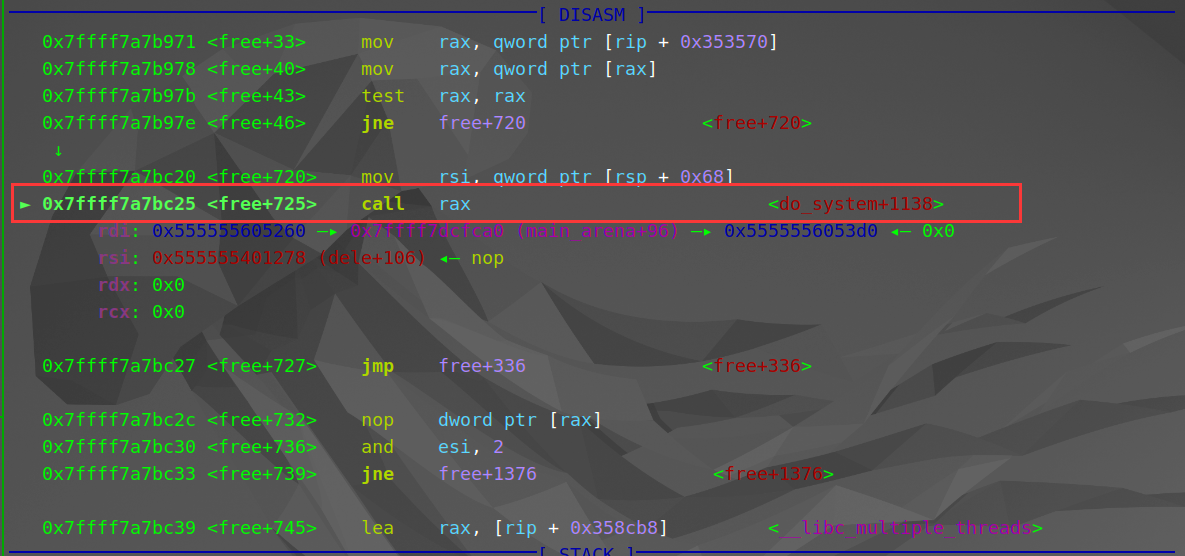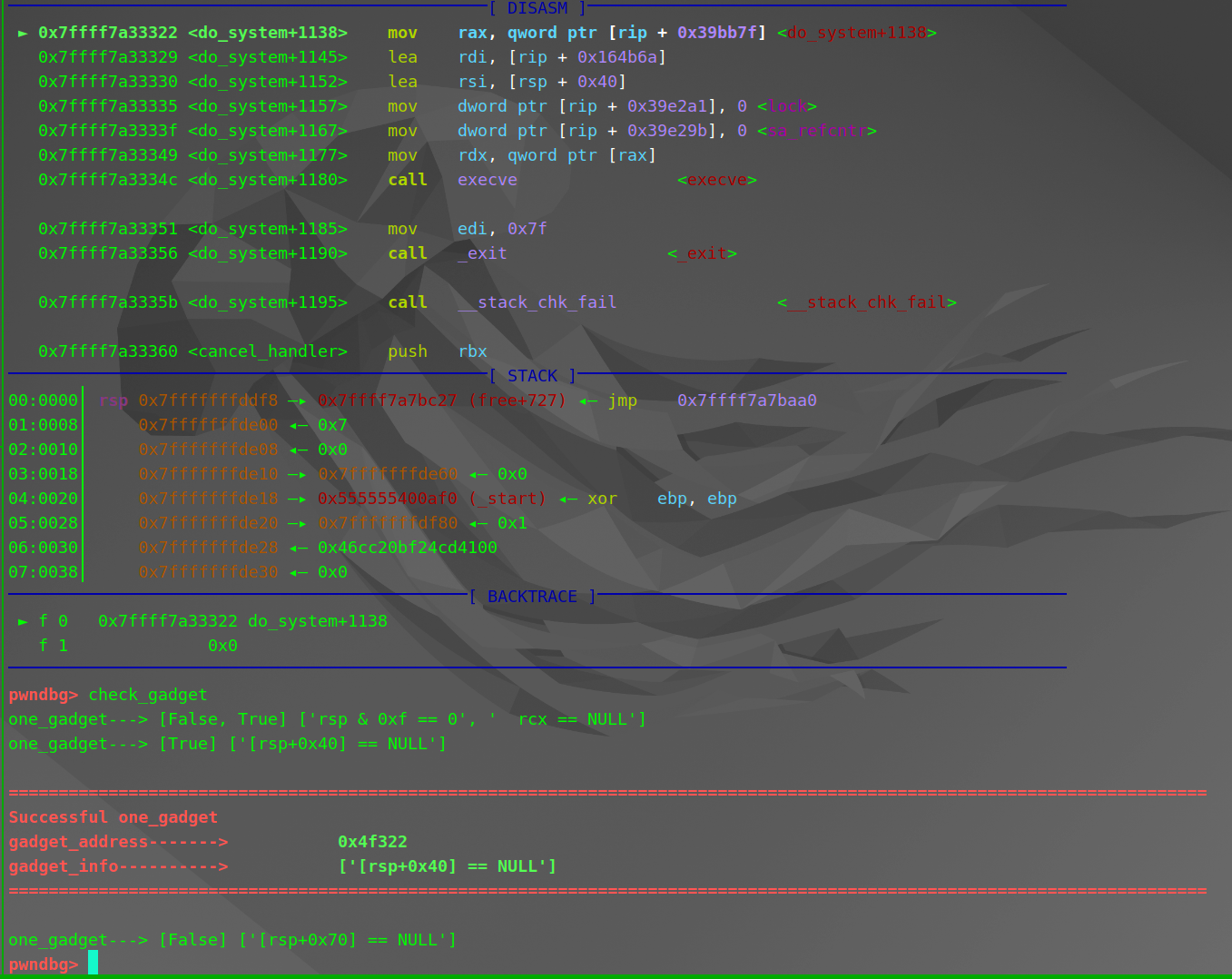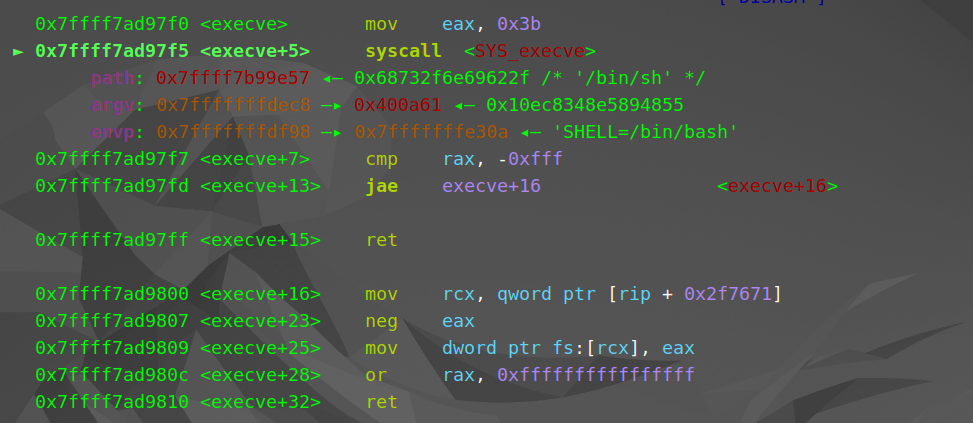import gdb
import subprocess
import sys
import re
def debug(a,b=""):
print(a,b)
def get_libc_path():
recv_data = gdb.execute("vmmap",to_string=True)
lines = recv_data.split("\n")
for line in lines:
if 'libc' in line:
string=line.split()[-1]
string = string[:-4]
return string
return None
def get_gadget_info(library):
"""
该函数作用是获取当前 libc 的 one_gadget信息 -l2除外
将每一组的 one_gadget 信息(地址和条件)放到一个元组里面,作为返回列表的一个元素
参数:
library(str): 当前程序所依赖的 libc 库路径
返回值:
gadgets_info(list): 列表中的元素是元组(装有一组 one_gadget 信息),后续进行条件判断时只需要对该列表进行遍历
"""
result = subprocess.run(["one_gadget", library], stdout=subprocess.PIPE, stderr=subprocess.PIPE)
if (result.returncode != 0):
print("Error: ", result.stderr.decode().strip())
sys.exit(result.returncode)
gadgets = result.stdout.decode().strip().split("\n\n")
gadgets_info = []
for gadget in gadgets:
address_line, constraints_line = gadget.strip().split("\nconstraints:")
address = address_line.strip().split()[0]
constraints = constraints_line.strip().split('\n')
gadgets_info.append((address, constraints))
return gadgets_info
def get_register_value(register):
return gdb.parse_and_eval('$'+register)
def get_address_permissions(address):
recv_data = gdb.execute("vmmap "+str(address),to_string=True)
if "There are no mappings for specified address or module" in recv_data:
return False
recv_data=recv_data.split('\n')[1]
recv_data=recv_data.strip().split()
permissions=recv_data[3]
if 'w' in permissions:
return True
else:
return False
def is_got_address_of_libc(string):
"""
该函数用来判断目标地址是否为 got_address_of_libc(这个地址是 libc 中具有 rw 权限的首地址)
参数:
string(str):传入的为 one_gadget 需要判断是否为 got_address_of_libc的字符串
例如:
"ebx is the GOT address of libc"
返回值:
(bool):如果目标地址为 got_address_of_libc 那么返回 True ,反之返回 False
"""
match=re.findall('(\w+) is the GOT address of libc',string)
register_value=get_register_value(match[0])
if int(register_value) < 0:
register_value=register_value+(1<<32)
recv_data = gdb.execute("vmmap",to_string=True)
lines = recv_data.split("\n")
for line in lines:
if "rw" in line and "libc" in line:
got_address_of_libc=line.split()[0][5:]
if register_value == int(got_address_of_libc,16):
return True
else:
return False
def is_writeable_check(string):
'''
这个函数的作用是来判断one_gadget中某个地址是否具有可写的权限
0xebcf5 execve("/bin/sh", r10, rdx)
constraints:
address rbp-0x78 is writable
[r10] == NULL || r10 == NULL
[rdx] == NULL || rdx == NULL
例如上面one_gadget的第一个条件 address rbp-0x78 is writable
该函数将自己获取rbp-0x78 (如果是单个寄存器也可以进行判断 比如判断rsi当前地址是否具有写的权限) 的地址判断其是否为一个具有写权限的地址
参数:
string(str):该参数是one_gadget关于某个地址是否为可写的条件字符串 例如“address rbp-0x78 is writable”
返回值:
(bool): 判断目标地址是否具有可写权限 如果具有写权限则返回True 反之返回False
'''
result = re.findall(r'(\w+)\s*([+-])\s*(\w+)', string)
if not result:
result = re.findall(r'\b\w+\b', string)
result = result[1]
if len(result)==1:
result=result[0]
register=result[0]
operator=result[1]
operand=result[2]
if operator == '-':
calc_value=int(get_register_value(register))-int(operand,16)
if operator == '+':
calc_value=int(get_register_value(register))+int(operand,16)
if calc_value == 0:
return False
return get_address_permissions(calc_value)
if len(result)==3:
register_value=get_register_value(result)
if register_value==0:
return False
return get_address_permissions(register_value)
def get_register_value_ptr(register):
"""
该函数作用获取寄存器所指向的值
参数:
register(str):被访问的寄存器名称
返回值:
(int):如果寄存器值为0或者寄存器的值为非法地址则返回-1 否则返回寄存器所指向的值
"""
address = gdb.parse_and_eval("$" + register)
if address == 0:
return -1
try:
if register[0] == 'r':
value = gdb.selected_inferior().read_memory(address, 8)
if register[0] == 'e':
value = gdb.selected_inferior().read_memory(address, 4)
except gdb.MemoryError:
return -1
return int.from_bytes(value, byteorder='little')
def condition_equal_A(condition_list):
"""rsp & 0xf == 0"""
condition_list=condition_list[0]
register,operator,operand=condition_list[0],condition_list[1],condition_list[2]
if operator == '&':
calc_value=int(get_register_value(register)) & int(operand,16)
if calc_value == 0:
return True
else:
return False
def condition_equal_B(condition_list):
"""rcx == NULL"""
register=condition_list[0]
calc_value=int(get_register_value(register))
if calc_value == 0:
return True
else:
return False
def condition_equal_C(condition_list):
"""(u16)[rbp] == NULL"""
condition_list=condition_list[0]
condition=condition_list[0]
register=condition_list[1]
if condition == "u16":
calc_value=int(get_register_value_ptr(register))
if calc_value == -1:
return False
calc_value=calc_value & 0xffff
if calc_value == 0:
return True
else:
return False
def condition_equal_D(condition_list):
"""[[rbp-0x70]] == NULL"""
condition_list=re.findall(r"\[(\w+)([+-])(\w+)", condition_list[0])
condition_list=condition_list[0]
register,operator,operand=condition_list[0],condition_list[1],condition_list[2]
if operator == '-':
calc_value = int(get_register_value(register)) - int(operand,16)
if calc_value == 0 - int(operand,16):
return False
if operator == '+':
calc_value = int(get_register_value(register)) + int(operand,16)
if calc_value == 0 + int(operand,16):
return False
if calc_value == 0:
return False
try:
if register[0] == 'r':
calc_value = gdb.selected_inferior().read_memory(calc_value, 8)
calc_value = int.from_bytes(calc_value, byteorder='little')
if register[1] == 'e':
calc_value = gdb.selected_inferior().read_memory(calc_value, 4)
calc_value = int.from_bytes(calc_value, byteorder='little')
except gdb.MemoryError:
return False
if calc_value ==0:
return False
try:
if register[0] == 'r':
calc_value = gdb.selected_inferior().read_memory(calc_value, 8)
calc_value=int.from_bytes(calc_value, byteorder='little')
if register[1] == 'e':
calc_value = gdb.selected_inferior().read_memory(calc_value, 4)
calc_value=int.from_bytes(calc_value, byteorder='little')
except gdb.MemoryError:
return False
if calc_value ==0:
return True
def condition_equal_E(condition_list):
"""[r10] == NULL"""
register=condition_list[0]
calc_value =get_register_value_ptr(register)
if calc_value == -1:
return False
if calc_value == 0:
return True
else:
return False
def condition_equal_F(condition_list):
"""[esp+0x3c] == NULL"""
condition_list=condition_list[0]
register,operator,operand=condition_list[0],condition_list[1],condition_list[2]
if operator == "+":
calc_value=int(get_register_value(register) + int(operand,16))
if operator == "-":
calc_value=int(get_register_value(register) - int(operand,16))
if calc_value == 0:
return False
try:
if register[0] == 'r':
calc_value = gdb.selected_inferior().read_memory(calc_value,8)
calc_value = int.from_bytes(calc_value, byteorder='little')
if register[0] == 'e':
calc_value = gdb.selected_inferior().read_memory(calc_value,4)
calc_value = int.from_bytes(calc_value, byteorder='little')
except gdb.MemoryError:
return False
if calc_value == 0:
return True
else:
return False
def equal_judgement(string):
"""
该函数来处理 one_gadget 中的等式判断,我目前发现 one_gadget中的等式一共有六种类型(如下)
"rsp & 0xf == 0",
"rcx == NULL",
"(u16)[rbp] == NULL",
"[[rbp-0x70]] == NULL",
"[r10] == NULL",
"[esp+0x3c] == NULL"
我通过正则表达式来识别出这六种情况,并将他们的关键信息匹配出来,再调用其对应的处理函数
参数:
string(str): 等式判断条件的字符串,例如 "[esp+0x34] == NULL"
返回值:
(bool): 如果等式成立则返回 True 不成立则返回 False
"""
judgement=[]
match=[]
judgement = re.findall(r"(\w+)\s*(\&)\s*(\w+)", string)
if judgement:
return condition_equal_A(judgement)
judgement = re.findall(r'\((\w+)\)\[(\w+)\]', string)
if judgement:
return condition_equal_C(judgement)
judgement = re.findall(r'\[(.*?)\]', string)
if judgement:
if len(judgement[0].split('[')) > 1:
return condition_equal_D(judgement)
else:
match = re.findall(r'(\w+)\s*([+-])\s*(.*)', judgement[0])
if match:
return condition_equal_F(match)
judgement = re.findall(r"(\w+) == NULL", string)
if judgement:
return condition_equal_B(judgement)
judgement = re.findall(r"\[(\w+)\] == NULL",string)
if judgement:
return condition_equal_E(judgement)
def check(constraints):
"""
该函数作用是将传入的每一组 one_gadget 按照条件进行分类,然后调用更具体的函数进行处理
目前我考虑了 one_gadget 的三种情况,分别是 is writeable 和 is got address of libc 以及对等式的判断
如果使用 l2 参数的话,会有更多的情况,我认为它们概率极小并且条件过于繁多,所以目前没有对它们进行判断
如果之后有条件没有考虑到需要添加的,或者想处理 l2 的 one_gadget 则在这里添加新的函数
参数:
constraints(list):存储的是一组的 one_gadget 所有信息
返回值:
(bool)如果当前这组 one_gadget 的所有条件都成立返回 True 反之有一个条件没有满足就返回 False
"""
result = []
result1 = []
for constraint in constraints:
if "is writable" in constraint:
result.append(is_writeable_check(constraint))
continue
if "is the GOT address of libc" in constraint:
result.append(is_got_address_of_libc(constraint))
continue
if "||" in constraint:
for i in constraint.split('||'):
if "== 0" in i or "== NULL" in i:
result1.append(equal_judgement(i))
result.append(any(result1))
result1 = []
continue
if "== 0" in constraint or "== NULL" in constraint:
result.append(equal_judgement(constraint))
continue
print('one_gadget--->', result, constraints)
return all(result)
def check_gadget_cmd():
"""
该函数为 check_gadget 命令的主函数
该命令实现了对当前位置概率略高的 one_gadget 能否生效做了判断
命令使用方法:
如果你想判断劫持执行流的这个位置是否有 one_gadget 能够生效,那么使用 gdb 调试到劫持执行流的地址处
使用该命令就可以看到是否有 one_gadget 能用了
目前只能判断概率较高的 one_gadget 能否使用,无法对 -l2 显示出来的 one_gadget 进行判断
check_gadget_cmd() 函数无参且无返回值
"""
libc_path=get_libc_path()
if libc_path == None:
print("\033[1;31m"+"Program is a static link!"+"\033[0m\n")
return
all_gadget_info=get_gadget_info(libc_path)
for i in range(len(all_gadget_info)):
gadget_address,gadget_constraints=all_gadget_info[i][0],all_gadget_info[i][1]
result=check(gadget_constraints)
if result:
print("\n\033[1;31m"+"="*120+"\033[0m")
print("\033[1;31m"+"Successful one_gadget"+"\033[0m","\033[1;31m")
print("\033[1;31m"+"gadget_address------->"+"\033[0m\t\t","\033[1;32m"+gadget_address+"\033[0m","\033[1;31m")
print("\033[1;31m"+"gadget_info---------->"+"\033[0m\t\t","\033[1;32m"+str(gadget_constraints)+"\033[0m")
print("\033[1;31m"+"="*120+"\033[0m\n")
gdb.execute("define check_gadget\n\tpython check_gadget_cmd()\nend")
|





